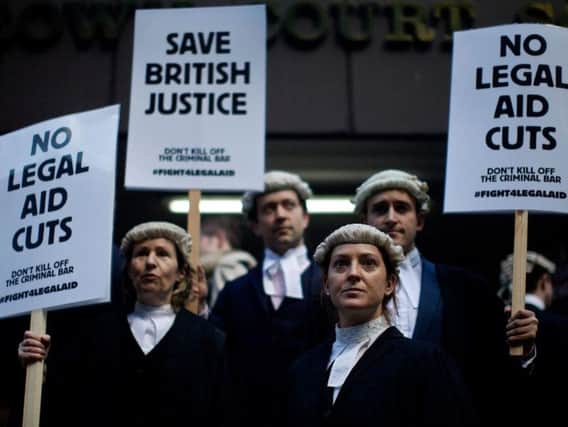Cuts to legal aid causing 'advice deserts', analysis shows


Doncaster is one of five areas of England and Wales with no legal aid providers of housing advice at all, forcing people to go further afield for help, new analysis shows.
Richard Miller, head of justice at the Law Society, said: “Provision of legal aid advice for areas of law, such as housing advice, is disappearing in large areas of England and Wales, creating legal aid deserts. Almost one third of legal aid areas have just one and – in some cases – zero law firms who can run a sustainable business providing housing advice through legal aid.
Advertisement
Hide AdAdvertisement
Hide Ad“The shortage in legal aid advice for housing means that people on low incomes facing homelessness and eviction are struggling to get the local face-to-face advice they desperately need and are entitled to by law.”
Legal aid offers publicly-funded support for people who cannot afford lawyers, but the Government reduced the types of cases eligible for the assistance to make savings in 2012.Since then, the number of people representing themselves in court has risen five-fold across England and Wales, according to the Personal Support Unit, which supplies volunteers to help them.
Access to legal aid for civil cases, such as housing, family or debt matters, has been hardest hit in the region, analysis by the BBC Shared Data Unit shows.
The number of solicitors taking on legal aid cases for civil matters across Yorkshire and the Humber has fallen by a quarter since 2011/12, from 322 to 242, while the number of not-for-profit advice networks taking on such cases has nearly halved in the same time period, from 39 to 20.
Advertisement
Hide AdAdvertisement
Hide AdRichard Burgon, Shadow Secretary of State for Justice, said cuts to legal aid “have deliberately weakened people’s ability to challenge injustices”.
The Leeds East MP said: “Cuts to publicly-funded legal support have left people unable to defend themselves against rogue landlords, tackle exploitation at work or the flawed benefits decisions that left them needing to use a food bank.”
Andrew Walker QC, chairman of the Bar Council, also warned of a “de-skilling” effect on the legal profession that could take years to repair.
He said: “With the withdrawal of legal aid from many areas of practice, and its restricted availability in others, we are facing a hollowing out and de-skilling of all parts of the legal profession in all of these areas.
Advertisement
Hide AdAdvertisement
Hide Ad“Without paying work in these areas, barristers are moving into other areas of practice, and new entrants are not being recruited into these areas. Without sufficient paying work, in areas of law which are often complicated and in which clients have complex and overlapping problems, it is difficult to build up and to maintain the level of expertise, experience and skills needed.”
The Government is currently undertaking a review of the changes, due to be published by the end of the year.
However, the Ministry of Justice refuted the suggestion that there were not enough solicitors or barristers for legal aid cases.
A spokesperson said: “Every person should have access to legal advice when they need it – that’s why the Legal Aid Agency keeps availability under constant review and takes urgent action whenever it has concerns.
Advertisement
Hide AdAdvertisement
Hide Ad“There are enough solicitors and barristers for criminal legal aid-funded cases across England and Wales and people can access legal aid advice via telephone for family, housing, and other issues for which legal aid is available as well as face to face.”